Movies and Social Activism - Part Two: The Marketplace's Favorites

Selecting five of our favorite socially relevant movies out of the hundreds produced was a challenging exercise. We selected Cry Freedom, Colors, Boyz N The Hood, Do the Right Thing, and Malcolm X. Each of these movies provided a unique insight into the societal events of their time. There are many others that are equally if not more important and insightful, these happen to be the ones that we chose as our favorites. We welcome you to share with us your favorites.
We encourage you to watch the trailers and if you haven't done so, rent the movie.
Enjoy
We encourage you to watch the trailers and if you haven't done so, rent the movie.
Enjoy
Cry Freedom - 1987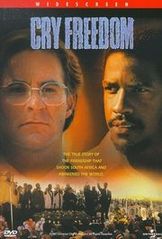
Cry Freedom is a 1987 British drama film directed by Richard Attenborough, set in the late 1970s, during the apartheid era of South Africa. It was written from a screenplay by John Brileybased on a pair of books by journalist Donald Woods. Denzel Washington stars as Biko, while actor Kevin Kline portrays Woods. Cry Freedom delves into the ideas of discrimination, political corruption, and the repercussions of violence. The film was nominated and won several awards in 1987–88. Among awards won were from the British Academy of Film and Television Arts, the Berlin International Film Festival and the Political Film Society. |
|
The premise of Cry Freedom is based on the true story of Steve Biko, the charismatic South African Black Consciousness Movement leader who attempts to bring awareness to the injustice of Apartheid; and Donald Woods, the liberal white editor of the Daily Dispatch newspaper who struggles to do the same after Biko is murdered. In 1972, Biko was one of the founders of the Black People's Convention working on social upliftment projects around Durban.
The BPC brought together almost 70 different black consciousness groups and associations, such as the South African Student's Movement (SASM), which played a significant role in the 1976 uprisings, and the Black Workers Project which supported black workers whose unions were not recognized under the Apartheid regime. Biko’s political activities eventually drew the attention of the South African government which often harassed, arrested, and detained him. These situations resulted in him being banned in 1973. The banning restricted Biko from talking to more than one person a time, in an attempt to suppress the rising anti-apartheid political movement. Following a violation of his banning, Biko was arrested and later killed while in police custody. The circumstances leading to Biko's death caused worldwide anger, as he became a martyr and symbol of black resistance. As a result, the South African government banned a number of individuals (including Donald Woods) and organizations, especially those closely associated with Biko. The United Nations Security Council responded swiftly to the killing by later imposing an arms embargo against South Africa.
The BPC brought together almost 70 different black consciousness groups and associations, such as the South African Student's Movement (SASM), which played a significant role in the 1976 uprisings, and the Black Workers Project which supported black workers whose unions were not recognized under the Apartheid regime. Biko’s political activities eventually drew the attention of the South African government which often harassed, arrested, and detained him. These situations resulted in him being banned in 1973. The banning restricted Biko from talking to more than one person a time, in an attempt to suppress the rising anti-apartheid political movement. Following a violation of his banning, Biko was arrested and later killed while in police custody. The circumstances leading to Biko's death caused worldwide anger, as he became a martyr and symbol of black resistance. As a result, the South African government banned a number of individuals (including Donald Woods) and organizations, especially those closely associated with Biko. The United Nations Security Council responded swiftly to the killing by later imposing an arms embargo against South Africa.
Colors - 1988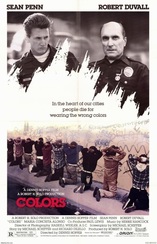
Colors is a 1988 crime drama directed by Dennis Hopper and starring Robert Duvall and Sean Penn as LAPD officers assigned to the department's CRASH ("Community Resources Against Street Hoodlums") anti-gang unit. The film is notable for being one of the first Hollywood attempts to realistically depict the Los Angeles gang problem, and for featuring many now well-known actors in minor supporting roles (including Don Cheadle, Damon Wayans, and Glenn Plummer, all of whom played gang-bangers here).
In a New York Times review the writer stated "What ''Colors'' does best is to create a sense of place and a climate of fear, to capture the vivid mark that gang life has left upon the downtown Los Angeles landscape. The look of this film, with its hard-edged, brightly sunlit urban settings and its constant threat of unanticipated motion, is genuinely three-dimensional and utterly enveloping." |
|
In Robert Ebert's review he says "There are many good moments in "Colors," but the one I will remember the longest is in the scene where a group of Los Angeles gang members are trying to explain why the gang is so important to them. Talking to a couple of cops, they describe the feeling of belonging - of feeling for the first time in their lives that they were part of a "family" that cared for them and was ready to die for them. The product of their family is, of course, tragic. Their gang deals in drugs, defends its turf and murders to enforce its authority."
Do The Right Thing - 1989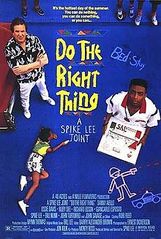
Do the Right Thing is a 1989 American drama film produced, written, and directed by Spike Lee, who is also a featured actor in the film. Other members of the cast include Danny Aiello,Ossie Davis, Ruby Dee, Richard Edson, Giancarlo Esposito, Bill Nunn, and John Turturro. It is also notably the feature film debut of Martin Lawrence and Rosie Perez. The movie tells the story of a neighborhood's simmering racial tension, which comes to a head and culminates in tragedy on the hottest day of the summer. The film was a commercial success and received numerous accolades and awards, including an Academy Award nomination for Lee for Best Original Screenplay and one for Best Supporting Actor for Aiello's portrayal of Sal the pizzeria owner. |
|
It is often listed among the greatest films of all time. In 1999, it was deemed to be "culturally significant" by the U.S. Library of Congress, and was selected for preservation in the National Film Registry, one of just five films to have this honor in their first year of eligibility
The film was released to protests from many reviewers, and it was openly stated in several newspapers that the film could incite black audiences to riot. No such riots occurred, and Lee criticized white reviewers for implying that black audiences were incapable of restraining themselves while watching a fictional motion picture.
One of many questions at the end of the film is whether Mookie "does the right thing" when he throws the garbage can through the window, thus inciting the riot that destroys Sal's pizzeria. Critics have seen Mookie's action both as an action that saves Sal's life, by redirecting the crowd's anger away from Sal to his property, and as an "irresponsible encouragement to enact violence". The question is directly raised by the contradictory quotations that end the film, one advocating non-violence, the other advocating violent self-defense in response to oppression.
Spike Lee has remarked that he himself has only ever been asked by white viewers whether Mookie did the right thing; black viewers do not ask the question. Lee believes the key point is that Mookie was angry at the death of Radio Raheem, and that viewers who question the riot's justification are implicitly valuing white property over the life of a black man.
The film was released to protests from many reviewers, and it was openly stated in several newspapers that the film could incite black audiences to riot. No such riots occurred, and Lee criticized white reviewers for implying that black audiences were incapable of restraining themselves while watching a fictional motion picture.
One of many questions at the end of the film is whether Mookie "does the right thing" when he throws the garbage can through the window, thus inciting the riot that destroys Sal's pizzeria. Critics have seen Mookie's action both as an action that saves Sal's life, by redirecting the crowd's anger away from Sal to his property, and as an "irresponsible encouragement to enact violence". The question is directly raised by the contradictory quotations that end the film, one advocating non-violence, the other advocating violent self-defense in response to oppression.
Spike Lee has remarked that he himself has only ever been asked by white viewers whether Mookie did the right thing; black viewers do not ask the question. Lee believes the key point is that Mookie was angry at the death of Radio Raheem, and that viewers who question the riot's justification are implicitly valuing white property over the life of a black man.
Boyz N The Hood - 1991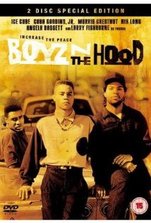
Boyz n the Hood is a 1991 American crime drama film written and directed by John Singleton. Starring Cuba Gooding, Jr., Ice Cube, Laurence Fishburne, Morris Chestnut, Nia Long, Angela Bassett and Regina King, the film depicts life in poor South Central (now South) Los Angeles, California and was filmed and released in the summer of 1991.
The film was critically acclaimed and received many awards. It was nominated for both Best Director and Original Screenplay during the 1991 Academy Awards, making Singleton the youngest person ever nominated for Best Director and the first African–American to be nominated for the award. In 2002, the United States Library of Congress deemed the film "culturally significant" and selected it for preservation in the National Film Registry. |
|
Malcolm X - 1992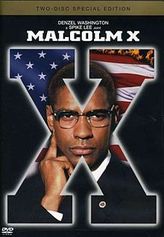
Malcolm X is a 1992 American biographical motion picture co-written, co-produced, and directed by Spike Lee. It stars Denzel Washington, Angela Bassett, Albert Hall, Al Freeman, Jr., and Delroy Lindo. Black Panther Party co-founder Bobby Seale, the Rev. Al Sharpton, and future South Africa president Nelson Mandela have cameo appearances. Spike Lee has a small role as Shorty, a character based partially on a real-life acquaintance, Malcolm "Shorty" Jarvis, a fellow criminal and jazz trumpeter.
Malcolm X was distributed by Warner Bros. and released on November 18, 1992. Denzel Washington won the New York Film Critics Circle Award for Best Actor and was nominated for an Academy Award for Best Actor. In 2010, the film was selected for preservation in the United States National Film Registry by the Library of Congress as being "culturally, historically, or aesthetically significant". |
|
The production was considered controversial long before filming began. The crux of the controversy was Malcolm X's inflammatory and often angry denunciation of whites before he undertook his hajj. He was, arguably, not well regarded among white citizens by and large; however, he had risen to become a hero in the black community and a symbol of blacks' struggles, particularly during the presidencies of Ronald Reagan and George H. W. Bush.
Once Warner Bros. agreed to the project, they initially wanted Academy Award-nominated Canadian film director Norman Jewison to direct the film. Jewison, director of the seminal civil rights film In the Heat of the Night, was able to bring Denzel Washington into the project to play Malcolm X. A protest erupted over the fact that a white director was slated to make the film. Spike Lee was one of the main voices of criticism; since college, he had considered a film adaption of The Autobiography of Malcolm X to be a dream project. Lee and others felt that it was appropriate that only a black person should direct Malcolm X.
The film was saved by the financial intervention of prominent black Americans, some of whom appear in the film: Bill Cosby, Oprah Winfrey, Michael Jordan, Magic Johnson, Janet Jackson, Prince, and Peggy Cooper Cafritz, founder of the Duke Ellington School of the Arts. Their contributions were made as donations; as Lee noted: "This is not a loan. They are not investing in the film. These are black folks with some money who came to the rescue of the movie. As a result, this film will be my version. Not the bond company's version, not Warner Brothers'. I will do the film the way it ought to be, and it will be over three hours." The actions of such prominent members of the African American community spurred the bond company and Warner Bros. to continue with the project.
Once Warner Bros. agreed to the project, they initially wanted Academy Award-nominated Canadian film director Norman Jewison to direct the film. Jewison, director of the seminal civil rights film In the Heat of the Night, was able to bring Denzel Washington into the project to play Malcolm X. A protest erupted over the fact that a white director was slated to make the film. Spike Lee was one of the main voices of criticism; since college, he had considered a film adaption of The Autobiography of Malcolm X to be a dream project. Lee and others felt that it was appropriate that only a black person should direct Malcolm X.
The film was saved by the financial intervention of prominent black Americans, some of whom appear in the film: Bill Cosby, Oprah Winfrey, Michael Jordan, Magic Johnson, Janet Jackson, Prince, and Peggy Cooper Cafritz, founder of the Duke Ellington School of the Arts. Their contributions were made as donations; as Lee noted: "This is not a loan. They are not investing in the film. These are black folks with some money who came to the rescue of the movie. As a result, this film will be my version. Not the bond company's version, not Warner Brothers'. I will do the film the way it ought to be, and it will be over three hours." The actions of such prominent members of the African American community spurred the bond company and Warner Bros. to continue with the project.
|
|

